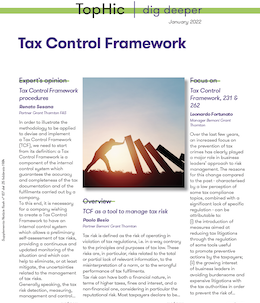-
Transactional advisory services
Find out more about the transactional advisory services of Grant Thornton Financial Advisory Services
-
Valuations
Find out more about the valuations services of Grant Thornton Financial Advisory Services
-
Mergers and acquisitions
Find out more about the merger and acquisition services of Grant Thornton Financial Advisory Services
-
Forensic and investigation services
Find out more about the forensic and investigation services of Grant Thornton Financial Advisory Services
-
Recovery & reorganisation
Find out more about the Recovery & reorganisation services of Grant Thornton Financial Advisory Services
-
Business risk services
Find out more about the business risk services of Grant Thornton Financial Advisory Services
-
Business consulting
Find out more about the business consulting services of Grant Thornton Financial Advisory Services
-
Capital market
Capital market
-
Corporate and business tax
Find out more about our corporate and business tax services.
-
Direct international tax
Find out more about our direct international tax services.
-
Global mobility services
Find out more about our global mobility services.
-
Indirect international tax
Find out more about our indirect international tax services.
-
Transfer pricing
Find out more about our transfer pricing services.
-
Litigation
Our lawyers and accountants can manage all defense measures provided not only by the Italian law, but also by EU regulations and conventions
-
Family business
Find out more about our Family business services.
-
Legal
The client can be assisted in every need and with the same care both on important operations or disputes and on simple matters

-
Back office outsourcing
Find out more about our Back office outsourcing services
-
Business process outsourcing
Find out more about our business process outsourcing services.
-
Compilation of financial statements
Find out more about our compilation of financial statements services.
-
Tax compliance
Find out more about our tax compliance services.
-
Electronic invoicing
Find out more about our electronic invoicing services
-
Electronic storage
Electronic storage is an archiving procedure that guarantees the legal validity of a digitally stored electronic document
-
Revaluation of corporate assets
Find out your civil and fiscal revaluation of tangible, intangible and financial assets
-
Payroll
Complete and customized payroll service, integrated with digital solutions and compliant with Italian and international regulations.
-
Labor consultancy
We help Italian and international companies manage all aspects of their workforce.
-
HR & Payroll Advisory Services
We review contracts, payroll, and risks for extraordinary transactions and we assess tax, labor, and safety risks in outsourcing contracts.
-
Extended services
We provide integrated digital tools to simplify HR management.
-
HR Infinity Portal
The HR Infinity Portal is Zucchetti’s platform designed to centralize communication between the company and its employees.
-
Cybersecurity
GT Digital helps clients structure information security management internal functions, also through partially or totally outsourced functions
-
Agile and Programme Management
GT Digital provides support in the adoption and implementation of different portfolio management
-
Robotic Process Automation
Our “BOT Farm” can rely on digital workers able to help clients in routine activities, allowing employees to deal with more added-value activities
-
Data strategy and management
GT Digital can support clients in seizing the opportunities offered by Big Data, from the definition of strategies to the implementation of systems
-
Enterprise Resource Planning
We support clients in selecting the most appropriate ERP System according to their specific needs, helping them also understand licensing models
-
IT strategy
GT Digital supports clients in making strategic choices, identifying innovation opportunities, comparing themselves with competitors
-
IT service management
We can support with software selection and with the implementation of dedicated tools for the management of ICT processes
-
DORA and NIS 2
The entry into force of the DORA Regulation and NIS2 represents a major step towards the creation of a harmonised regulatory framework
Over the last few years, an increased focus on the prevention of tax crimes has clearly played a major role in business leaders’ approach to risk management. The reasons for this change compared to the past - characterised by a low perception of some tax compliance topics, combined with a significant lack of specific regulation - can be attributable to:
- the introduction of measures aimed at reducing tax litigations through the regulation of some tools useful to promote preventive actions by the taxpayers;
- the growing interest of business leaders in avoiding burdensome and expensive litigations with the tax authorities in order to prevent the risk of incurring in administrative and criminal penalties; and, last but not least
- the certain reputational damage which the perpetration of a tax offence could cause to the company, as well as to its management and to the various stakeholders.
As mentioned above, one of the key drivers of this change was the innovative approach - although still limited to date - adopted by the Italian tax lawmaker, in line with the international context (e.g. the various work by the OECD aimed at promoting transparency and exchange of information between taxpayers and tax authorities. To this end, it is worth recalling:
- the introduction of the cooperative compliance regime by art.3 and following articles of Legislative Decree no. 128/2015;
- the broadening of the list of predicate offences regarding administrative liability of entities (Legislative Decree no. 231/2001) to include some types of criminal tax offences ex art. 39 of Law Decree no. 124/2019.
The regulatory interventions above, although different as concerns their scope, have provided a strong incentive to businesses - and moreover to their managers - to adopt systems aimed at the prevention rather than the treatment of tax risk. The analysis of the abovementioned regulatory interventions allows to appreciate the soundness and effectiveness of some tools aimed at providing businesses with protection tools. Below in this article, we will try to outline the main features, highlighting the possible opportunities and obvious benefits.
The update of tax protections ex Law no. 231 as a first step for the implementation of a TCF
Legislative Decree no. 231/2001 regulates the administrative liability of entities originating from crimes, i.e. the potential imposition of sanctions in those cases in which a third party (e.g. a top manager) commits specific types of crimes (the so-called predicate offences) in favour of the entity.
In order to avoid the application of penalties and the subsequent entity’s liability to prosecution, which in some cases may lead to significant consequences for the business organisation (e.g. suspension of the activity), the entity has the opportunity to adopt risk prevention systems with effective control measures (also including the setting up of a dedicated independent, third-party board) aimed at the prevention and reduction of risks.
The list of the abovementioned predicate offences has recently been extended to include some specific types of tax offences. Actually, Law no. 257/2019 entered into force on 25 December 2019, converting the so-called Tax Decree (Law Decree no. 124/2019, containing urgent norms on tax matters for non-delayable requirements), introduced specific tax crimes within the scope of predicate offences (art. 25- quinquiesdecies of Legislative Decree no. 231/01) from which the administrative liability of entities originates. In particular, the following new offences have been introduced:
- fraudulent tax return through the use of invoices or other documents for non-existent transactions (art. 2 of Legislative Decree no. 74/2000);
- fraudulent tax return through other means (art. 3 of Legislative Decree no. 74/2000);
- issuance of invoices for non-existent transactions (art. 8 of Legislative Decree no. 74/2000);
- concealment and destruction of accounting records (art. 10 of Legislative Decree no. 74/2000);
- tax evasion (art. 11 of Legislative Decree no. 74/2000);
- inaccurate tax return (art. 4 of Legislative Decree no. 74/2000), omitted tax return (art. 5 of Legislative Decree no. 74/2000) and undue tax credit offsetting (art. 10-quarter of Legislative Decree no. 74/2000), should they be committed exclusively within fraudulent cross-border systems in order to evade VAT for an amount exceeding 10 million Euros.
The inclusion of the abovementioned offences: (i) on the one hand, led to the update of Organisation Models already in force through the drafting - where missing - of dedicated procedures aimed at reducing tax risks (limited to the cases above) and (ii) on the other hand, drove all those businesses lacking a suitable Organisation Model to adopt appropriate procedures to limit possible negative consequences of tax offences (actually, the potential perpetration of tax offences is certainly of interest to more taxpayers, as opposed to other types of crimes - including predicate offences - which refer exclusively to some categories of taxpayers).
In such context the update of control systems brings significant benefits in terms of systematisation of actions to prevent tax risks. Actually, the adjustment (and/or ex-novo implementation) of control systems ex Law 231, though limited to the updates above, allows to:
- identify and assess the so-called sensitive activities, whose performance may imply the perpetration of tax offences (with exclusive reference to the new predicate offences);
- identify and recognise the control systems already in place;
- evaluate the soundness and completeness of information flows with reference to both supervisory bodies and the various interrelations among the various functions;
- highlight the main weaknesses and gaps in the process (gap analysis).
A significant part of the activity also concerns:
- the formalisation of ad hoc procedures useful to identify operating methods, general principles of conduct, information flows and people in each function accountable for monitoring the most important tax activities such as, among others, the drafting and finalisation of tax returns (VAT return, IRES and IRAP returns);
- the integration and update of procedures aimed at strengthening the protections already in place with a view to the prevention of tax risk.
The update and/or implementation of control systems in line with the predicate (tax) offences under Law 231 is to be considered as an effective first step for the introduction of systems/procedures guaranteeing a high-level tax risk monitoring and control within the organisation. Actually, the mere implementation of the abovementioned activities and tools - useful to correctly update the Organisation Model to the most recent regulatory novelties - is aimed, generally speaking, at the mere prevention of specific tax offences. Therefore, the broadening of some categories of tax offences within the scope of predicate offences under Law 231 and the relevant required updates can be a significant opportunity to consider the adoption of a more systematic and comprehensive strategy for the prevention of tax offences, i.e. the possibility to undertake a path aimed at the implementation of a Tax Control Framework (also TCF).
This opportunity is even more relevant for those organisations which, besides an Organisation Model ex Law 231, also have procedures in place deriving from the provisions of art. 154-bis of the Consolidated Law on Finance (so-called TUF), i.e. the drafting by the director in charge of preparing corporate accounting documents, of suitable administrative and accounting procedures for the preparation of the financial statements for the FY and, where provided, of the consolidated financial statements, as well as of any other financial communication.
Said procedure, although reserved to specific contexts and taxpayers, is significant as it undoubtedly helps to strengthen the prevention system, focusing on one of the most relevant aspects related to tax, i.e. the correct compilation and management of accounting records.

